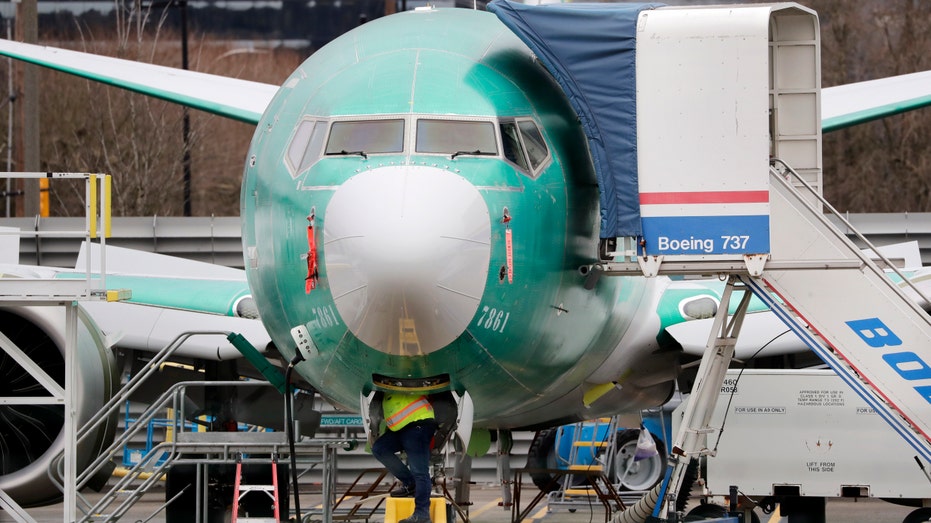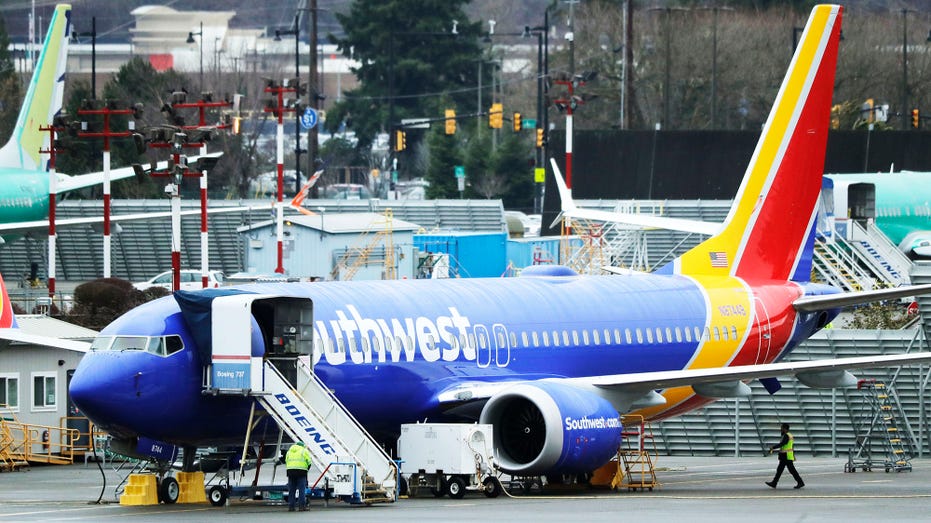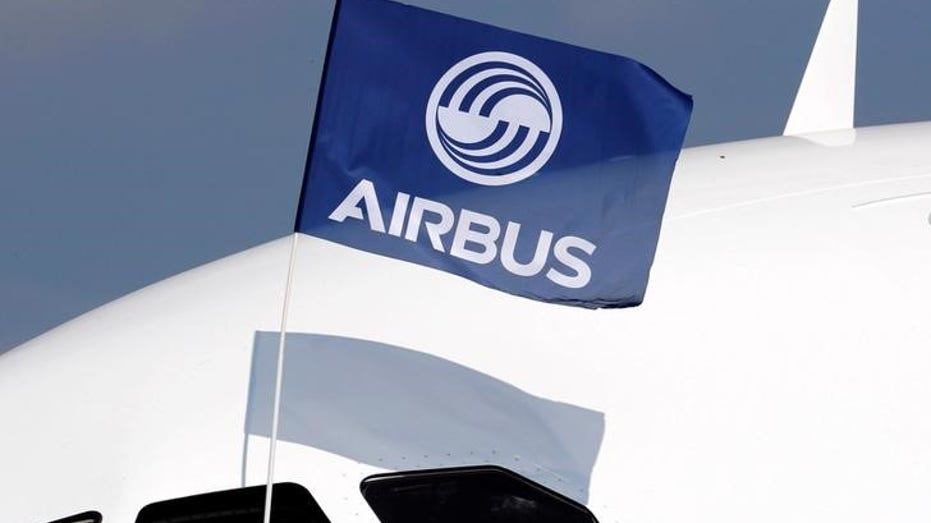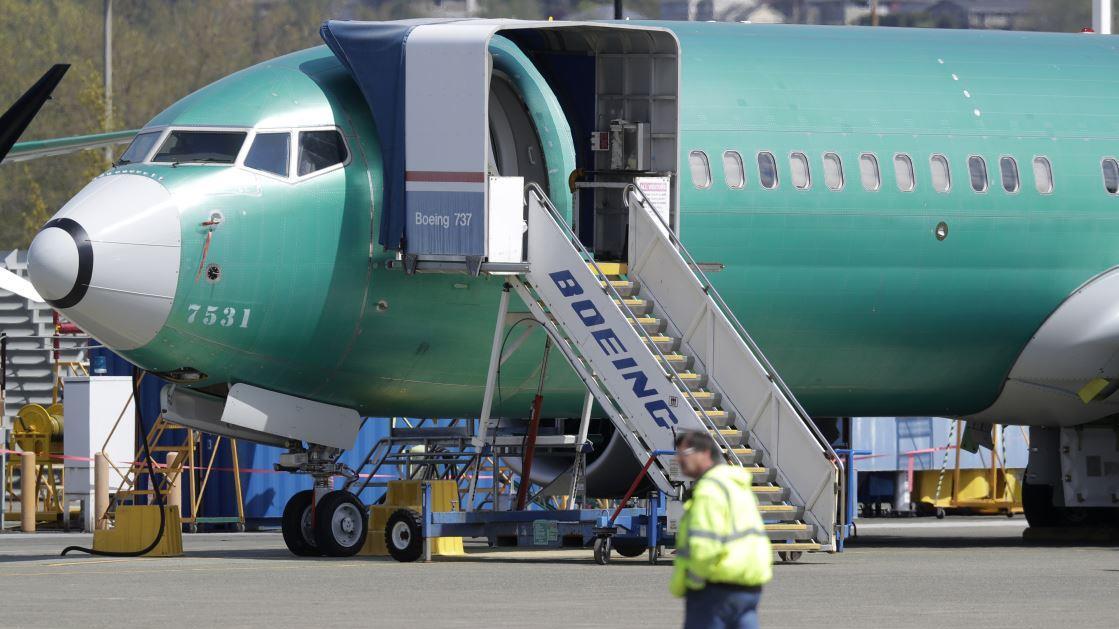Boeing 737 Max timeline: From best-seller to burden
737 Max was introduced to compete with rival Airbus's A320neo
Boeing's 737 Max is the plane that almost wasn't.
In the early 2010s, the Chicago-based planemaker was planning to design and build an all-new single-aisle jetliner to replace its 737, the top-selling single-aisle jetliner introduced in 1967, rather than offer another upgrade.
Then, the marketplace forced it to shift gears: Jet fuel prices were skyrocketing, and airline customers were demanding greater fuel-efficiency sooner rather than later, pressure that rival Airbus had met by rolling out the competing A320neo.
GET FOX BUSINESS ON THE GO BY CLICKING HERE
Boeing's then-CEO Jim McNerney, who had promised an all-new jet that wouldn't be ready before 2020 or so, bowed to the inevitable as Airbus racked up sales for a plane that promised a 15% improvement in fuel burn, dubbing it the 737 Max.
The decision appeared to pay off: By the start of 2019, Boeing had won more orders for the jet than any model in its history. Less than three months later, however, it was grounded worldwide, pending a patch for anti-stall software blamed in two crashes that had killed 346 people, and attracting scrutiny over how it had won regulatory approval for use on commercial flights.
Following are the major development's in the aircraft's journey from conception to best-seller and then to bete-noir:
Dec. 1, 2010: Airbus introduces the A320neo, an upgrade to its direct competitor with Boeing's 737.
Aug. 30, 2011: Boeing unveils 737 Max, reversing course on its previous strategy of developing a brand new airplane.
Nov. 3, 2011: Boeing reports 600 order commitments from eight airlines.
Nov. 30, 2011: Boeing says it will build the 737 Max at its Renton, Wash., plant, quelling speculation that it might move production to South Carolina to take advantage of lower labor costs.
Jan. 5, 2012: Boeing reports more than 1,000 order commitments from 15 customers, promising that 2012 will be the "year of the 737 Max."
CLICK HERE TO READ MORE ON FOX BUSINESS
June 26, 2012: Ray Conner, 57, is appointed to succeed Commercial Airplanes chief Jim Albaugh, who is retiring.
June 29, 2013: Boeing says it expects to deliver the first 737 Max to launch customer Southwest Airlines in the third quarter of 2017, three months earlier than originally scheduled.
Oct. 29, 2013: Boeing engineers confirm an additional 1 percent fuel-efficiency improvement to the 13 percent customers were promised previously.
May 20, 2014: Boeing says the Max has won more than 2,000 orders worth $209 billion at list prices.
Oct. 13, 2014: Boeing starts production of 737 Max parts.

A worker looks underneath a Boeing 737 MAX jet in Renton, Wash. (AP Photo/Elaine Thompson, File)
May 7, 2015: Boeing begins flight tests of CFM International's Leap-1B engine for the 737 Max.
June 2, 2015: Boeing starts production of first 737 Max.
July 1, 2015: Dennis Muilenburg becomes CEO, succeeding Jim McNerney, who held the job for 10 years.
Dec. 8, 2015: The first completed 737 Max rolls out of paint hangar.
Jan. 29, 2016: 737 Max successfully completes its first flight, spending two hours and 47 minutes in the air.
Nov. 21, 2016: Boeing names GE Aviation executive Kevin McAllister to succeed Ray Conner as Commercial Airplanes chief.
March 9, 2017: Federal Aviation Administration certifies the 737 Max 8, the first of the Max series, for commercial flights.
May 17, 2017: Lion Air Group subsidiary Malindo Air accepts first 737 Max 8 and expects to be the first airline to use it on commercial flights.
WALL STREET PEGS BOEING'S 737 MAX BILL AT MORE THAN $25B
Aug. 30, 2017: Southwest Airlines says it has taken delivery of its first 737 Max 8 and expects to have 14 Max planes by year's end.
July 2, 2018: Ethiopian Airlines, Africa's biggest and fastest-growing carrier, takes delivery of the first of 30 Max airplanes.
Oct. 29, 2018: Lion Air Flight 610, from Jakarta, Indonesia, to the island of Sumatra, crashes into the Java Sea moments after takeoff, killing all 189 people on board.
November 2018: Indonesia's National Transportation Safety Committee issues a preliminary report on the accident indicating that the plane's computer had received erroneous data on its takeoff vector from sensors. The report included a bulletin from Boeing telling pilots how to deactive an automated system that could repeatedly try to lower the airplane's nose to prevent a stall in such cases.
Nov. 7, 2018: The FAA sends an emergency airworthiness directive to operators of the 737 Max-8 and Max-9, warning that repeated nose-down commands from the automated system, if not deactivated, might make it difficult for pilots to control the plane and cause a crash.
Nov. 21, 2018: Boeing says it's cooperating with investigators and remains confident in the safety of the Max.

Workers walk near a Southwest Airlines Boeing 737 Max parked at Renton Municipal Airport in Renton, Wash. (AP Photo/Ted S. Warren, File)
March 10, 2019: Ethiopian Airlines Flight 302 crashes six minutes after takeoff from Bole International Airport in Addis Ababa, killing all 157 people on board. China's Civil Aviation Authority grounds the 737 Max-8, citing similarities between the two crashes.
March 12, 2019: Sen. Mitt Romney, R-Utah, urges the FAA to follow the lead of the European Union, Indonesia and Australia by grounding the Max-8.
BOEING 737 MAX PRODUCTION FREEZE TO END IN MONTHS
March 12, 2019: President Trump says on Twitter that over-reliance on digital technology is making jetliners "too complex to fly." Boeing CEO Dennis Muilenburg tells the president by phone that the airliner is safe to fly.
March 12, 2019: Canada grounds the 737 Max 8 after flight data from the Ethiopian crash show sharp changes in the ascent angle similar to those recorded during the takeoff of the doomed Lion Air jet.
March 13, 2019: FAA grounds the 737 Max; carriers from American to United and Southwest race to rebook passengers whose flights were canceled as a result.
March 19, 2019: CEO Muilenburg posts a video on Boeing's website promising the company understands that lives depend on its work.
March 19. 2019: Transportation Secretary Elaine Chao asks her department's inspector general to review the FAA's original certification of the 737 Max for commercial flights.
March 2019: Cowen & Co. analyst Helaine Becker warns that the Max grounding will curb the typical revenue boost for American, Southwest and United from spring break and Easter holiday travel.
March 27, 2019: Acting FAA Administrator Randy Elwell defends the agency's approval process for new airplanes in a hearing before the Senate Subcommittee on Aviation and Space, chaired by Sen. Ted Cruz.
BOEING CEO PROMISES 737 MAX WILL BE ABLE TO COMPETE HEAD-ON
April 2, 2019: Boeing promises a "thorough and methodical approach" to a patch for anti-stall software linked to the two crashes.
April 4, 2019: Boeing admits its anti-stall software is partly to blame for the crashes and promises its patch will address the issue. "It's our responsibility to eliminate this risk," says Muilenburg, the CEO. "We own it and we know how to do it."
April 8, 2019: American Airlines cancels 5,000 flights on the 737 Max, removing it from bookings through June 5.
May 15, 2019: Republican lawmakers defend the U.S. process for evaluating new commercial aircraft during a hearing called by the House Transportation Committee on the two crashes.
May 29, 2019: Boeing's Muilenburg defends the process, too, citing a 95 percent reduction in fatal crashes over 20 years.
June 18, 2019: Boeing wins a tentative commitment from British Airways to buy 200 Max airplanes, valued at about $24 billion.
BOEING 737 MAX WON'T RESUME FLIGHTS UNTIL FAA CHIEF FLIES IT HIMSELF
July 8, 2019: Boeing loses a $5.9 billion order for the 737 Max from budget Saudi Arabian carrier flyadeal to rival Airbus.
July 24, 2019: Boeing reports a $2.9 billion loss in the three months through June, citing a $4.9 billion charge for concessions to airline customers whose profits were damaged by the Max's grounding.

A flight test engineer holds an Airbus Group flag after the first flight of the Airbus A320neo near Toulouse, France, in 2014. REUTERS/Regis Duvignau/File Photo
Oct. 11, 2019: Muilenburg relinquishes the role of chairman to focus on returning the 737 Max to commercial flights.
Oct. 22, 2019: Boeing names Stan Deal to replace Kevin McAllister as head of Commercial Airplanes.
Dec. 23, 2019: Muilenburg resigns as Boeing CEO, effective immediately. Planemaker says independent chairman David Calhoun, a former senior managing director with Blackstone Group, will take his place.
BOEING SECURES $13B IN LOANS AMID 737 MAX CRISIS
Jan. 9, 2020: Boeing releases hundreds of internal messages that prompt further questions about the 737 Max's development, according to Reuters; "This airplane is designed by clowns who in turn are supervised by monkeys," one employee wrote.
Jan. 13, 2020: Calhoun takes the reins as Boeing's third CEO in the past five years.
Jan. 29, 2020: Boeing posts a full-year loss of $636 million for 2019, its first on an annual basis since 1997.
Feb. 4, 2020: Bloomberg reports that Boeing has secured $13 billion in financing to weather a potential cash crunch.
Feb. 22, 2020: Reuters reports that Boeing inspections have uncovered debris in dozens of fuel tanks on undelivered 737 Max planes.




















